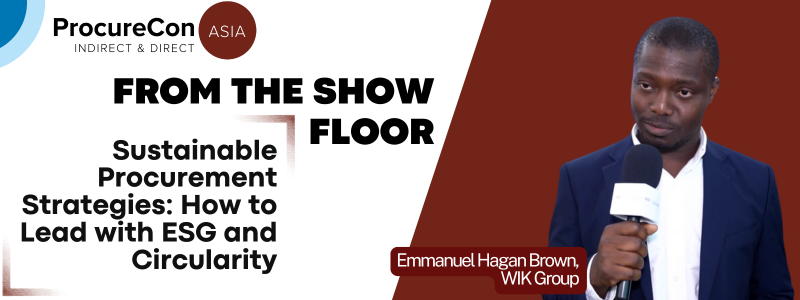Sustainable Procurement Strategies: How to Lead with ESG and Circularity

"As someone who grew up in Ghana, seeing the devastating effects of pollution firsthand, I’ve always believed that businesses shouldn’t contribute to the problem, they should be part of the solution." – Emmanuel Hagan Brown, Global Supplier Sustainability and Innovation Management Lead, WIK Group
This personal commitment fuels Emmanuel’s transformative approach to sustainable procurement. But the reality? Achieving sustainability in procurement isn’t easy. With growing regulatory pressures, the need for data transparency, and challenges like supplier buy-in and regional discrepancies, procurement leaders are grappling with how to turn sustainable goals into real-world practices.
In this exclusive interview, Emmanuel reveals how WIK is overcoming these challenges through innovative procurement strategies designed for long-term success. Here are the key takeaways:
- Holistic Sustainability Strategy: The challenge many CPOs face is integrating these practices seamlessly into existing operations. Emmanuel explains how WIK made sustainability a foundational aspect of their procurement process from day one, ensuring all suppliers meet strict ESG standards and the steps you can take to do the same.
- Supplier Engagement & Innovation: Through their Supplier Sustainability Management Program, WIK engages suppliers year-round, driving sustainability-driven innovation with financial and non-financial incentives.
- Circular Economy in Action: WIK encourages circularity in their supply chain by working with suppliers to recycle materials, helping reduce waste and prevent pollution, particularly in communities like Batam, Indonesia, where local residents are incentivized to recycle plastic bottles for manufacturing.
- Transparency & Technology: Using tools like ePro and SAP, WIK ensures full transparency in their supply chain, tackling challenges like data quality and ensuring suppliers meet high sustainability standards.
- Global Impact, Local Action: WIK bridges the gap between global and regional sustainability standards, making their impact both global and locally relevant.
These strategies not only promote environmental responsibility but also create meaningful social change, driving impact both in the supply chain and local communities. Watch the full video to learn how you can apply these strategies to drive sustainability in your procurement process.